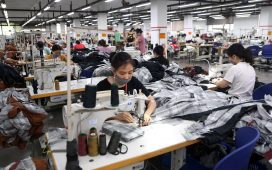The online fashion retailer Asos said sales in July and August were hit by wet weather, prompting it to cut its estimate for annual profits.
Asos said the poor weather compounded weaker online demand for clothing. Total sales declined by 15% in the quarter to 3 September, with the UK down 16%. The sales washout resulted in a £60m hit to cashflow. July was the wettest such month in England since 2009.
“Across many of our markets (but most notably the UK), the hot weather drove a strong June and a wet July and August produced a weaker sales result,” the retailer said.
Asos, which enjoyed a sales surge during the pandemic amid a shift to online shopping, has since experienced slowing demand as shoppers return to the high street and many consumers struggle with higher bills in the cost of living crisis. The company has reduced its stock levels by 30%.
The company now expects underlying full-year profits to come in at the bottom end of its range of £40m to £60m. It made a pre-tax loss of £291m in the first half of the year after writing down more than £100m of unwanted stock.
The update from Asos was in contrast to Next, Britain’s biggest clothing retailer, which last week raised its full-year profit expectations for the third time in four months after better ranges, the sunny spring and pay rises for many of its customers helped lift sales.
Asos sought an £80m cash injection from shareholders and borrowed £275m from the specialist lender Bantry Bay Capital in May to give it “financial headroom” as it seeks to return to profitability within a year, by cutting costs, simplifying its processes and becoming more innovative.
José Antonio Ramos Calamonte, the chief executive, said Asos was a “leaner and more resilient business” after the cost savings and stock reductions. “We have reduced our stock balance by 30%, significantly improved the core profitability of the business and generated cash against a very challenging market backdrop,” he added.
While customer numbers have fallen 9% to 23.3 million active customers, Asos increased profit on each order by 35%.
Aarin Chiekrie, an analyst at Hargreaves Lansdown, said: “Gross margins are heading back in the right direction as freight costs have pulled back from 2022’s peaks. The oversized inventory levels have also been brought back down to earth faster than expected..”
after newsletter promotion
Jocelyn Paulley, the co-head of the UK retail sector at the law firm Gowling WLG, said: “It’s been a difficult period for Asos, having been hit hard by the cost-of-living crisis, rising inflation and changing consumer trends post-pandemic. However, the business is hopeful that the turnaround plan under the chief executive, José Antonio Ramos Calamonte, could help it to get back on track by focusing on profitability instead of revenue growth.
“The plan has seen the company scale back on its discounting to reduce the pressures of rising costs as it looks to write off a significant amount of its inventory to tackle the increase in customers returning products. Also, a reshuffle in senior leadership with the appointment of two new non-executive directors should bring in some fresh ideas and strategies to enhance the online retailer’s offering and strengthen its growth.
“There will be continued challenges as the economic situation remains bleak, but shareholders will be hoping the business can roll up its sleeves and get itself on more solid financial foundations under Calamonte’s transformation plan.”








